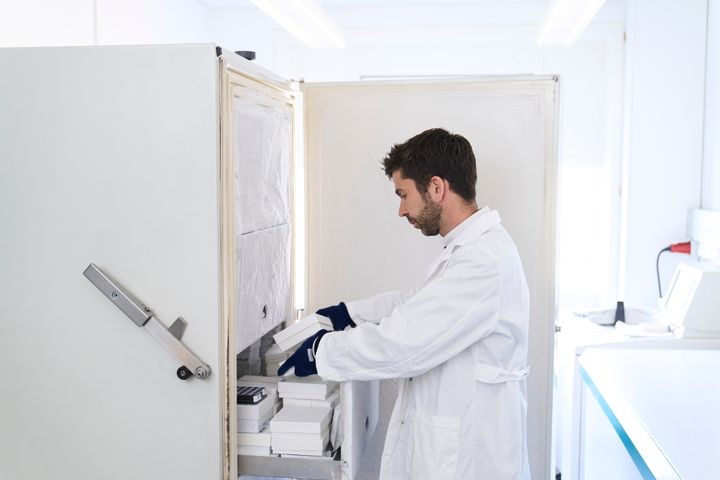Some guts are better than others at harvesting energy
25.12.2022 08:00:00 CET | Københavns Universitet | Press release

Unfair as it, some of us seem to put on weight just by looking at a plate of Christmas cookies, while others can munch away with abandon and not gain a gram. Part of the explanation could be related to the composition of our gut microbes. This, according to new research conducted at the University of Copenhagen’s Department of Nutrition, Exercise and Sports.
Researchers studied the residual energy in the faeces of 85 Danes to estimate how effective their gut microbes are at extracting energy from food. At the same time, they mapped the composition of gut microbes for each participant.
The results show that roughly 40 percent of the participants belong to a group that, on average, extracts more energy from food compared to the other 60 percent. The researchers also observed that those who extracted the most energy from food also weighed 10 percent more on average, amounting to an extra nine kilograms.
"We may have found a key to understanding why some people gain more weight than others, even when they don't eat more or any differently. But this needs to be investigated further," says Associate Professor Henrik Roager of the University of Copenhagen’s Department of Nutrition, Exercise and Sports.
May increase the risk of obesity
The results indicate that being overweight might not just be related to how healthily one eats or the amount of exercise one gets. It may also have something to do with the composition of a person’s gut microbes.
Participants were divided into three groups, based on the composition of their gut microbes. The so-called B-type composition (dominated by Bacteroides bacteria) is more effective at extracting nutrients from food and was observed in 40 percent of the participants.
Following the study, the researchers suspect that a portion of the population may be disadvantaged by having gut bacteria that are a bit too effective at extracting energy. This effectiveness may result in more calories being available for the human host from the same amount of food.
"The fact that our gut bacteria are great at extracting energy from food is basically a good thing, as the bacteria's metabolism of food provides extra energy in the form of, for example, short-chain fatty acids , which are molecules that our body can use as energy-supplying fuel. But if we consume more than we burn, the extra energy provided by the intestinal bacteria may increase the risk of obesity over time," says Henrik Roager.
Short travel time in the gut surprises
From mouth to esophagus, stomach, duodenum and small intestine, large intestine and finally to rectum, the food we eat takes a 12-to-36-hour journey, passing several stations along the way, before the body has extracted all the food’s nutrients.
The researchers also studied the length of this journey for each participant, all of whom had similar dietary patterns. Here, the researchers hypothesized that those with long digestive travel times would be the ones who harvested the most nutrition from their food. But the study found the exact opposite.
"We thought that there would be a long digestive travel time would allow more energy to be extracted. But here, we see that participants with the B-type gut bacteria that extract the most energy, also have the fastest passage through the gastrointestinal system, which has given us something to think about," says Henrik Roager.
Confirms previous study in mice
The new study in humans confirms earlier studies in mice. In these studies, it was found that germ-free mice that received gut microbes from obese donors gained more weight compared to mice that received gut microbes from lean donors, despite being fed the same diet.
Even then, the researchers proposed that the differences in weight gain could be attributable to the fact that the gut bacteria from obese people were more efficient at extracting energy from food. This is the theory now being confirmed in the new study by the Department of Nutrition, Exercise and Sports.
"It is very interesting that the group of people who have less energy left in their stool also weigh more on average. However, this study doesn’t provide proof that the two factors are directly related. We hope to explore this more in the future," says Henrik Roager.
About gut bacteria:
- Everyone has a unique composition of gut bacteria – shaped by genetics, environment, lifestyle and diet.
- The collection of gut bacteria, called the gut microbiota, is like an entire galaxy in our gut, with a staggering 100 billion of them per gram of stool.
- Gut bacteria in the colon serve to break down food parts that our body’s digestive enzymes can’t, e.g., dietary fibre.
- Humans can be divided into three groups based on the presence and abundance of three main groups of bacteria that most of us have: B-type (Bacteroides), R-type (Ruminococcaceae) and P-type (Prevotella).
About the study
- Read the scientific paper.
- Watch video about the research.
- The energy content of stool specimens from 85 overweight Danish women and men was examined.
- Participants included men and women from 22 to 66 years old.
- 40 percent of participants fell into a special group, characterized by having a lower diversity of gut bacteria and faster travel time for food through their digestive tracts.
- This group was also found to have less residual energy in their stool compared to the other two groups, which could not be explained by differences in habitual diet.
- The researchers also observed that the group with less energy in their stool also weighed more than the other groups.
Keywords
Contacts
Contact:
Henrik Roager
Associate Professor
Department of Nutrition, Exercise and Sports
University of Copenhagen
hero@nexs.ku.dk
+ 4535324928
25480699
Michael Skov Jensen
Journalist and team coordinator
The Faculty of Science
University of Copenhagen
+ 45 93 56 58 97
msj@science.ku.dk
Images

Links
About Københavns Universitet
Københavns Universitet blev grundlagt i 1479 og har i dag cirka 37.000 studerende og 10.000 ansatte – heraf flere end 5.000 forskere – og en omsætning på 9,4 milliarder kroner. 10 nobelpriser er blevet tildelt forskere med tilknytning til universitetet.
Subscribe to releases from Københavns Universitet
Subscribe to all the latest releases from Københavns Universitet by registering your e-mail address below. You can unsubscribe at any time.
Latest releases from Københavns Universitet
Algoritmer afslører nye sider af det moderne gennembruds litteratur3.2.2026 13:16:47 CET | Pressemeddelelse
Forskere fra Københavns Universitet har digitaliseret 850 romaner fra det moderne gennembrud (1870-1900) og analyseret dem ved hjælp af algoritmer og AI. De kan nu vise, at perioden gemmer på en række oversete værker, der behandler temaer som køn og religion på overraskende måder.
Ny forskning: Styrket tidlig indsats giver markant færre ordblinde elever2.2.2026 09:50:41 CET | Pressemeddelelse
Et nyt undervisningsprogram målrettet elever i 1. klasse med øget risiko for ordblindhed har stor positiv effekt, viser en ny undersøgelse ved Center for Læseforskning på Københavns Universitet. I 3. klasse var andelen af ordblinde betragteligt lavere blandt de elever, der havde deltaget i det nye undervisningsprogram sammenlignet med eleverne i kontrolgruppen.
Vores tvivl på egne valg skyldes forskellige mekanismer30.1.2026 05:00:00 CET | Pressemeddelelse
Vi mennesker kan tvivle på os selv – også når vi præsterer bedre eller lige så godt som andre. Ny forskning viser, at tvivlen opstår på forskellig vis, blandt andet afhængigt af, om man er kvinde eller mand, og om man har tilbøjelighed til angst eller ej.
Lavsbundsjorde skal ikke stå under vand for at give størst klimagevinst29.1.2026 08:51:59 CET | Pressemeddelelse
Stik imod forventningen skal lavbundsjorde ikke oversvømmes helt for at give den største klimagevinst. Vandspejlet skal derimod være under jordoverfladen og ligge stabilt, viser et nyt studie fra Københavns Universitet. Drivhusgassen metan og mikroorganismer i jorden er en game changer.
Frygt for karrieren driver – og vælter – brutale regimer20.1.2026 20:30:00 CET | Pressemeddelelse
Ny forskning viser, at ambitioner og angst kan forvandle ’almindelige mænd’ til et regimes hensynsløse håndlangere – eller dets omvæltere. Det er nemlig karrierepres – ikke ideologi – der får militærofficerer til at beskytte eller vælte diktatorer.
In our pressroom you can read all our latest releases, find our press contacts, images, documents and other relevant information about us.
Visit our pressroom
